Key takeaways:
- Community recycling programs enhance waste management efficiency and foster neighborhood pride, emphasizing the importance of education to prevent contamination.
- Environmental education sparks awareness and action, transforming individuals into advocates for sustainable practices within their families and communities.
- Successful recycling initiatives build a sense of community, provide economic benefits, and encourage local businesses to adopt greener practices.
- Challenges such as participation reluctance, confusion over guidelines, and limited funding hinder the effectiveness of community recycling programs, necessitating improved communication and accessible resources.
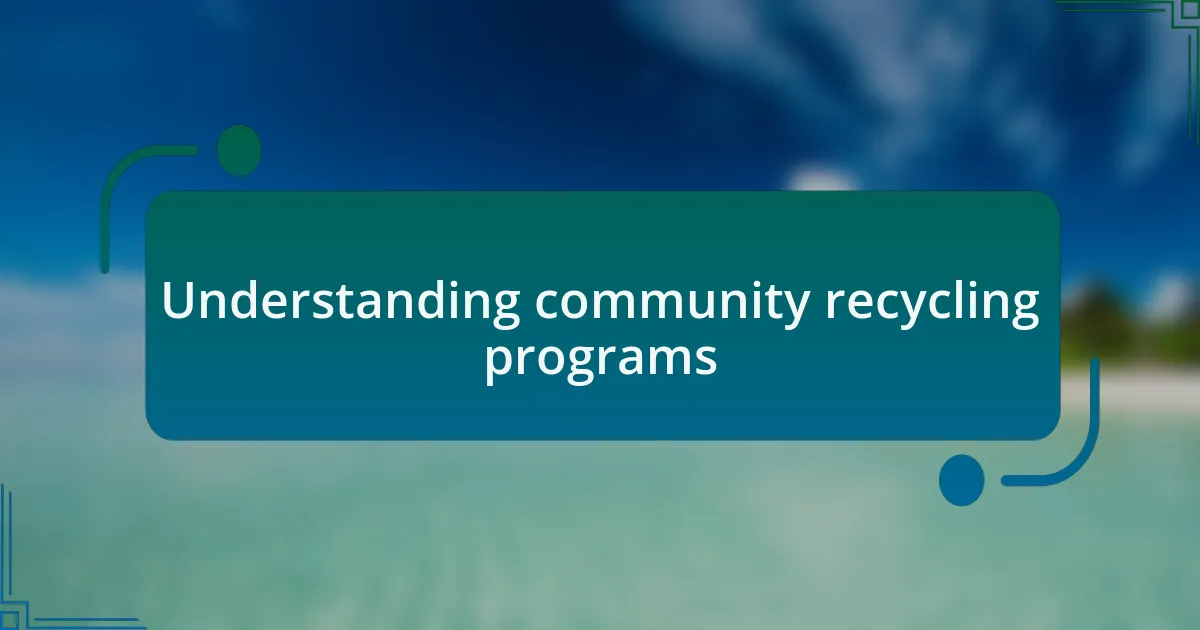
Understanding community recycling programs
Community recycling programs are designed to make waste management more efficient and environmentally friendly. From my experience, these initiatives empower residents to participate actively in sustainability efforts, fostering a sense of pride in their neighborhoods. Have you ever felt that rush of satisfaction after dropping off your recyclable materials? It’s a small action that contributes to a larger cause.
I remember volunteering at a local recycling event, where I saw firsthand how eager people were to learn about what can be recycled. Many were surprised to discover that items like plastic utensils and pizza boxes were often not accepted. This just shows the importance of education in these programs. It made me realize how crucial it is to provide clear guidelines and support to avoid contamination in recycling streams.
Additionally, community recycling programs often reflect the values of the neighborhood they serve. A successful program not only reduces waste but also creates opportunities for collaboration among residents, local businesses, and government agencies. Have you noticed how communities can bond over shared goals, like improving recycling rates? It’s fascinating to see how these initiatives can transform not just our environment but also our relationships with one another.
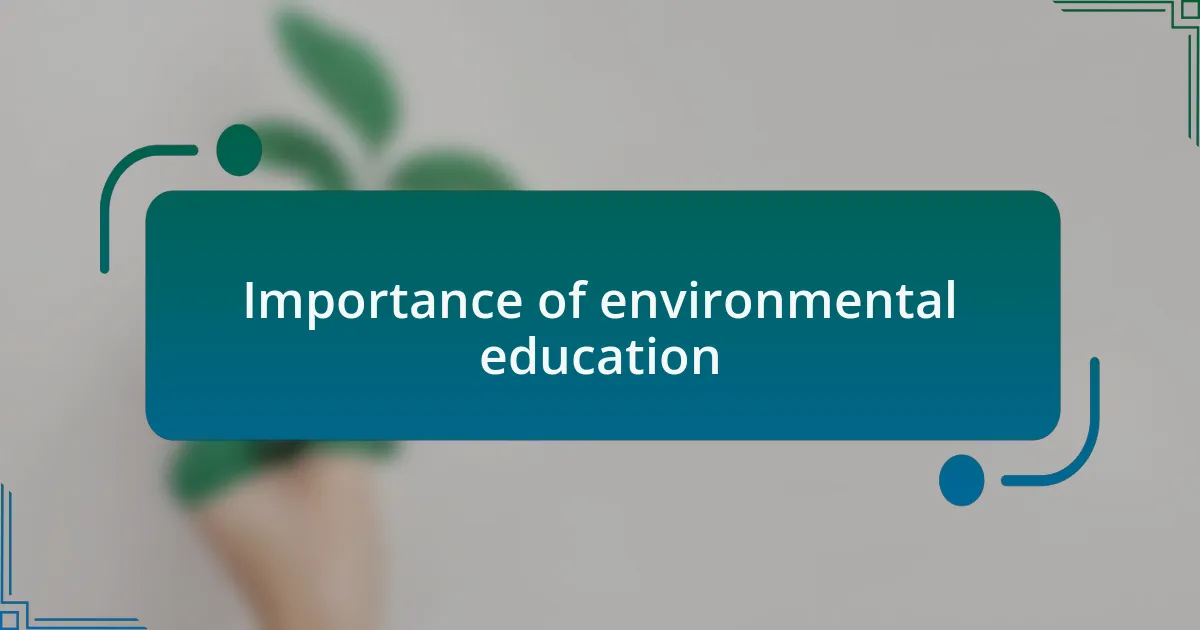
Importance of environmental education
Environmental education plays a critical role in empowering individuals to make informed decisions about their behaviors and the impact they have on our planet. I once attended a workshop that delved into the principles of sustainability, and it struck me how much people wanted to understand the consequences of their actions. Have you ever seen someone light up when they grasp how recycling can lead to a healthier environment? That moment of clarity is invaluable.
Moreover, effective environmental education encourages not just awareness, but action. I remember a community leader sharing how their program dramatically increased participation after they conducted educational sessions at local schools. It was inspiring to see students advocate for recycling within their families, transforming what started as a classroom lesson into home-based action. Isn’t it amazing how education can spark a ripple effect?
In my view, environmental education also highlights the interconnectedness of our communities and ecosystems. When individuals learn about the benefits of recycling, they often become more curious about other environmental issues, from water conservation to biodiversity. Can you imagine the cumulative effect if everyone took that leap into deeper environmental understanding? It’s a journey that starts with education and unfolds into a more sustainable future.
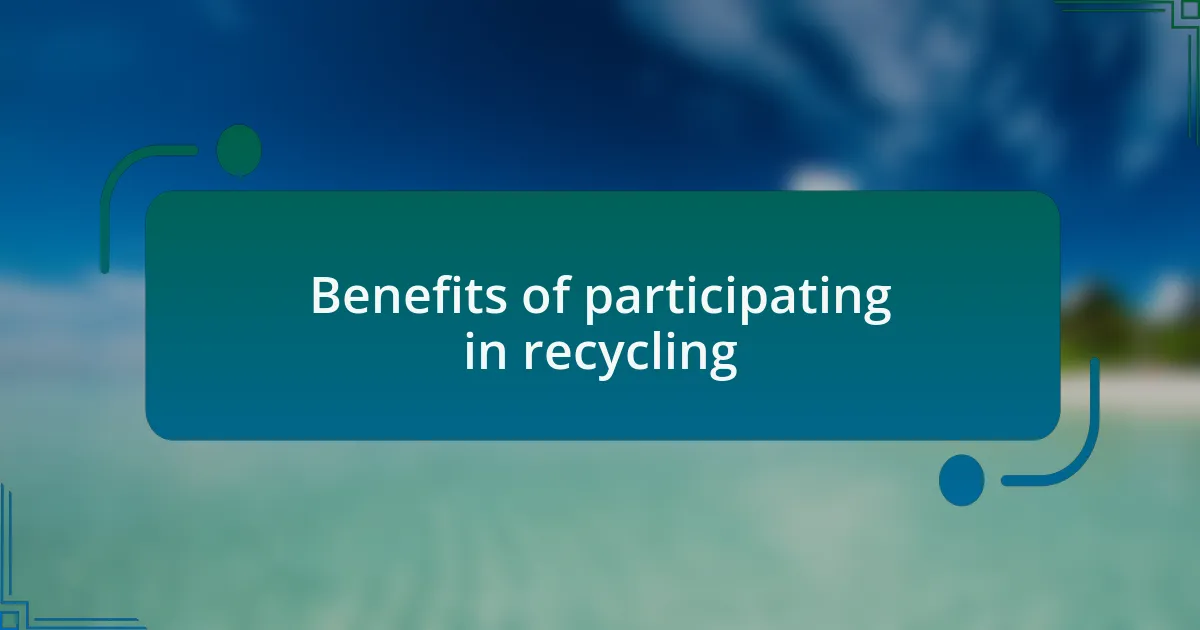
Benefits of participating in recycling
Participating in recycling offers significant benefits beyond just reducing waste. I recall a community cleanup day where we separated recyclables from trash, and it was eye-opening to see how much material could be repurposed. Imagine the satisfaction of knowing that your simple actions, like sorting paper and plastics, contribute to conserving natural resources and energy. Doesn’t that make you feel like part of something bigger?
Engaging in recycling also fosters a sense of community pride. During a local recycling drive, I noticed neighbors coming together, sharing tips, and celebrating their collective efforts. It felt really powerful to witness how this initiative not only cleaned up our streets but also strengthened social bonds. Have you ever felt that sense of belonging that comes when you’re contributing to something that matters?
Moreover, recycling can have economic benefits for the community. I learned that many towns save money on waste management by diverting materials from landfills. The funds saved can be redirected to other local projects, like parks or educational programs. Isn’t it encouraging to realize that through our recycling efforts, we’re not only helping the environment but also enhancing our community’s well-being?
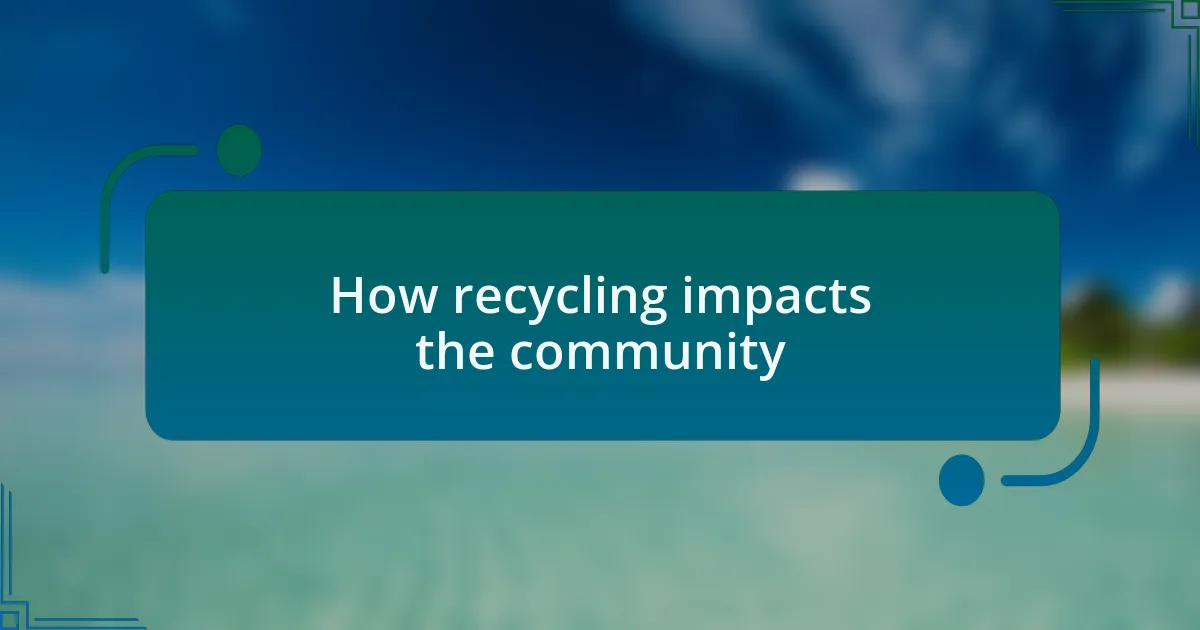
How recycling impacts the community
Recycling impacts the community in profound ways, often sparking a collective sense of responsibility. I remember attending a town hall meeting focused on our recycling program, and the energy in the room was palpable. When residents shared their personal experiences of how recycling improved their neighborhoods, it was clear that sustainable practices brought us closer together. Did you ever think about how such small changes can ripple through the community?
Beyond camaraderie, recycling plays an essential role in building local ecosystems. One chilly Saturday morning, I volunteered with a group to plant trees in a nearby park, funded by recycling initiatives. It was inspiring to see how our recycling efforts directly contributed to enhancing leisure spaces for everyone. These projects not only beautify our surroundings but also foster connections to nature. Isn’t it amazing how the simple act of recycling can create a lasting impact?
Furthermore, recycling initiatives often encourage local businesses to adopt greener practices, creating a sustainable economy. I recently chatted with a local café owner who implemented a composting system alongside recycling bins. She mentioned how her patrons love the eco-friendly approach, leading to increased foot traffic and loyalty. Doesn’t it excite you to think about how community-driven recycling can support local entrepreneurship and foster innovation?
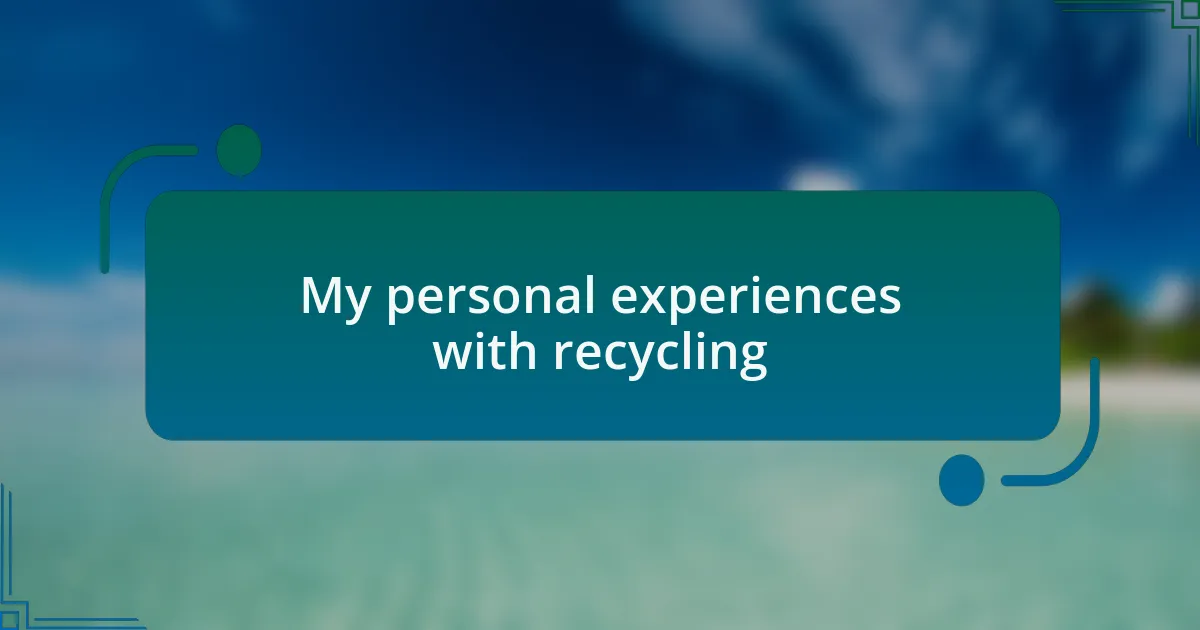
My personal experiences with recycling
My journey with recycling began when I was a child, sorting through our family’s recyclables. I vividly remember my excitement each week as I would rush to the curb, eager to see the bright blue recycling bin filled to the brim. Taking part in that small ritual made me feel empowered, as though I was playing a role in something much larger than myself. Have you ever felt that thrill of contributing to a shared cause?
As an adult, my commitment to recycling only deepened. I joined a local community group that organized clean-up days, and during one of our events, I found an old, rusted bicycle frame. Instead of tossing it aside, we brainstormed creative ways to repurpose it into a piece of public art. The satisfaction of transforming waste into beauty was immeasurable. How often do we overlook the potential in what we discard?
Through my experiences, I’ve seen how recycling can foster unexpected friendships. At one neighborhood event, I bonded with a fellow volunteer over our mutual love for eco-friendly crafting. Together, we started a community workshop that teaches others to upcycle materials into useful items. It’s uplifting to witness people coming together, sharing skills, and fueling a passion for sustainability. Isn’t it wonderful how recycling can connect us in meaningful ways?
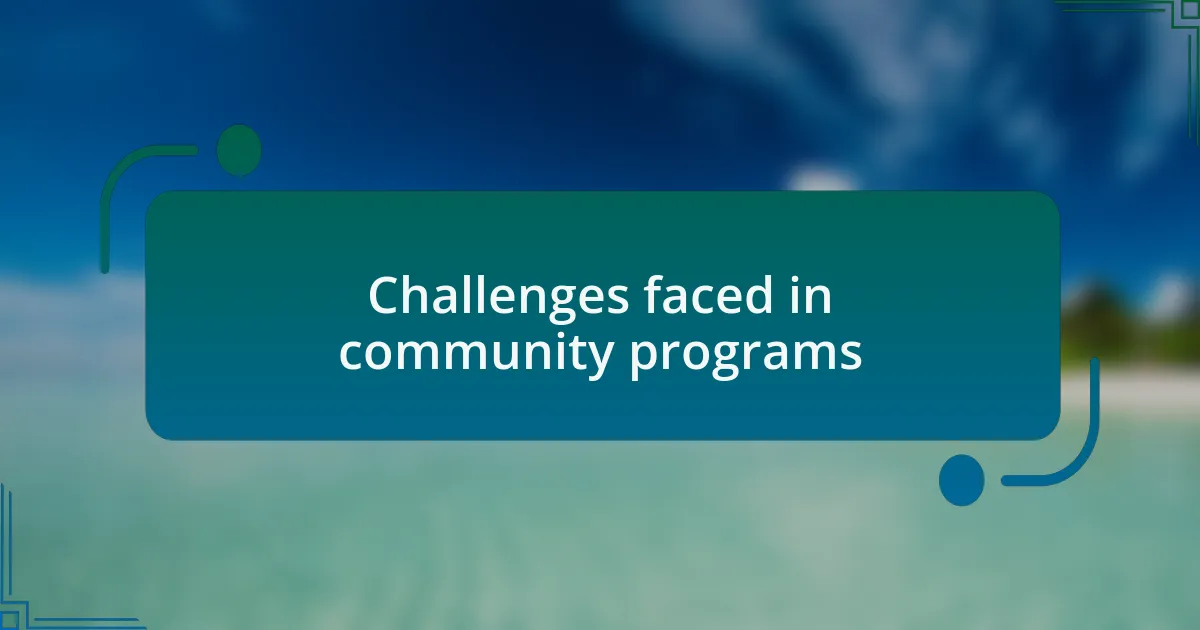
Challenges faced in community programs
Community recycling programs often encounter significant challenges that can hinder their effectiveness. One issue I’ve noticed firsthand is a lack of participation, where residents simply don’t engage as much as needed. My old neighborhood had a recycling initiative that struggled to appeal to families with busy schedules. Isn’t it disheartening when the intention is there, but the turnout just doesn’t match the enthusiasm?
Another challenge arises from the confusion surrounding recycling guidelines. I remember attending a community meeting where countless residents questioned what to recycle and what not to. The mixed messages about acceptable materials left many feeling frustrated. This confusion not only leads to contamination of recyclables but also discourages people from participating altogether. Have you ever hesitated to throw something in the recycling bin, unsure if it would truly be recycled?
Lastly, funding and resources are often limited, which can stifle the growth of community programs. I’ve seen local initiatives struggle to secure enough financial backing to expand or promote their efforts effectively. This shortfall can result in inadequate educational outreach or insufficient collection infrastructure. Reflecting on this, it’s clear that without investment in these programs, the potential for widespread environmental impact remains unfulfilled. Isn’t it crucial that we find sustainable solutions to support these valuable community efforts?
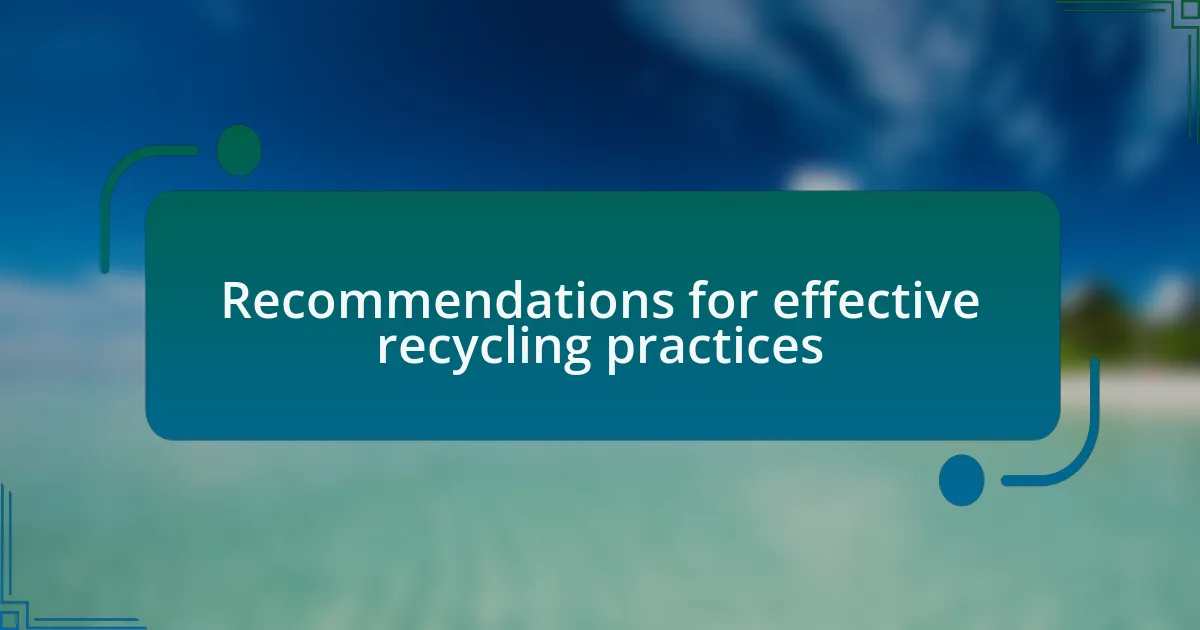
Recommendations for effective recycling practices
When developing effective recycling practices, clear communication is essential. I once volunteered at a local event where we provided residents with easy-to-understand guides that outlined what could and couldn’t be recycled. It was amazing to see how this small step led to a noticeable increase in participation; many people expressed relief at finally knowing the rules. Have you ever felt a sense of clarity boost your confidence in managing your waste?
Additionally, I believe that creating accessible recycling stations can make a huge difference. During a recent community clean-up, we set up clearly labeled bins for different materials, and the response was overwhelmingly positive. People appreciated the simplicity of knowing exactly where to place their items, and it made recycling feel less like a chore and more like a collaborative effort. Is it possible that a little organization can turn recycling from a daunting task into a daily habit?
Finally, incorporating educational workshops can significantly enhance community engagement. I recall attending a hands-on session that taught both kids and adults the importance of recycling and how to do it effectively. Watching the excitement on children’s faces as they learned about the recycling journey made me realize that education fosters a deeper connection to community initiatives. Isn’t it fascinating how knowledge can empower individuals to become advocates for sustainable practices?